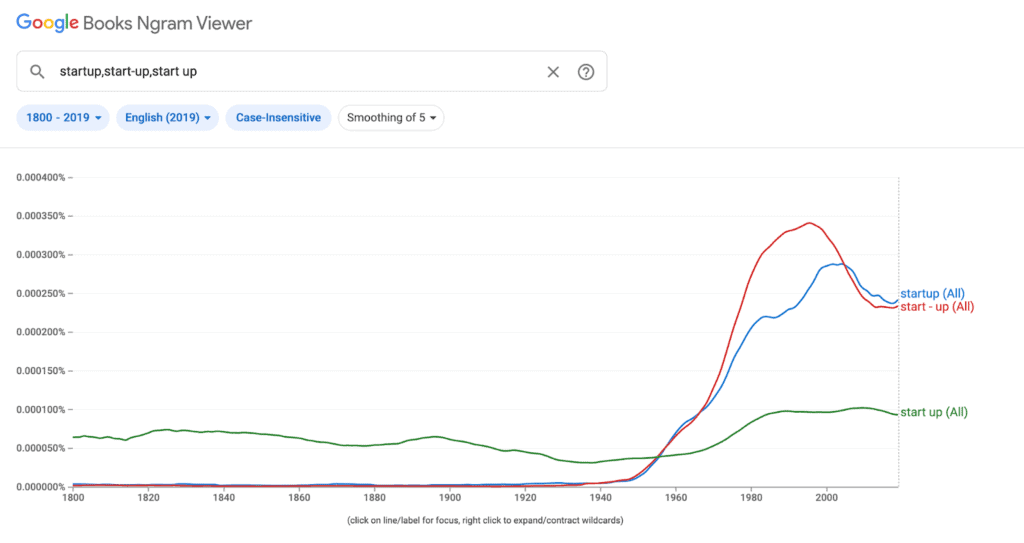The short answer to this question is: both are acceptable. Stay consistent with your use, but you can get away with either. The general consensus is, however, incorrect that “start-up” tends to get more usage as a noun, and “startup” tends to get more usage as a verb in the context of budding businesses. There’s more to the story…
Before we dive in, it’s helpful to remember language evolves over time, and the term “startup”/ “start-up” is relatively new to the scene. So new in fact, that it hardly got any usage until the 1940s. Don’t believe us? Here’s a look at Google Books Ngram Viewer for “startup, start-up, and start up”:

This graph brings up a few interesting points. You’ll see that “startup” just recently surpassed “start-up” in usage frequency. This seems to follow with the convention of dropping the hyphen over time.
Many newer words do this. In fact, at least 1600 words have lost their hyphen over time. Perhaps we just get lazy, or perhaps that word begins to take on a new life of its own to the point that we, as a collective, start to unconsciously and consciously give it the weight of its own standalone concept; and therefore, its own word. It’s as if the idea grows to the point of being able to stand on its own, finally recognizable without the hyphen. Some other examples include:
- On-line became online
- E-mail became email
- Low-life became lowlife
- Cry-baby became crybaby
And so on.
But what about “start-up”?
According to Merriam-Webster’s Dictionary, a start-up is “a fledgling business enterprise,” which basically means a new business entity that is immature in its growth. Oxford Dictionary defines the term similarly, using a hyphen, while dictionary.com defines it without the hyphen. This makes sense, as Oxford and Merriam tend to keep to more traditional definitions, while dictionary.com tends to be quicker to adapt to the flexibility of more modern conventions.
All of this is not to get confused with the other definition: “the act or an instance of setting in operation or motion”. Although we may be able to easily glean the etymology of our newly minted term “start-up” through this definition, we can see the distinction. This would make sense why the Google Ngram usage over time is relatively stable for “start up” (ie “He helped start up my car). Quite the difference from the “start-up” that might pop into your mind now (ie techies in Silicon Valley, and other modern startup stories).
So when to use startup or start-up?
If we are using the ruling logic of the day, you have two options:
- Use startup consistently: this tends to be more casual and aligned with colloquial jargon that is ultimately grammatically correct.
- Use start-up consistently: this is more formal and widely accepted as dictionary approved.
Each would be grammatically correct, and you likely wouldn’t get any red squiggles or shade from coworkers.
Let’s say you were planning a press release, you might say, “A New Start-Up Aims To Teach The World Grammar.” Or perhaps you take the more colloquial approach for your job posting: “A New Startup You’ll Love To Join.” Either is fine, just stick to your own style. Keep in mind, however, if you stick to start-up there may come a day when you’re in the minority, as history repeats itself and more and more drop the hyphen.
While some basic searching might bring you to articles espousing “start-up” is best used as a noun, and “startup” as a verb, there is no strong evidence suggesting this is grammatically correct. The debate rages on, many explaining there is in fact no use for “startup” as a verb, grammatically speaking.
Ultimately, the good news is, you aren’t the only one confused about the correct spelling for this particular word. Hyphen’s in general can be confusing, and not all of us are grammar experts. Hopefully this clears things up.
We figured since our team created StartUp Networx, StartUp Blogpost and StartUp Rebates, we should dig into this and find out once and for all 🙂

